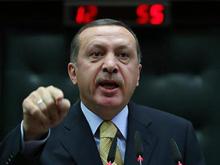
Apparently having listened to the advice from his close associates, Erdoğan has decided to meet with representatives of the protesters on June 12. However, he has not expressed a willingness to make concessions. “Our Prime Minister will meet with representatives of the groups that organized the demonstrations. I think the meeting will happen on Wednesday,” Turkish Deputy Prime Minister Bülent Arınç said on June 10, offering no further details. The Prime Minister himself, however, has called the demonstrators “extremists” and “looters,” and he threatened to answer them in “the language they understand” if they do not leave the streets. Erdoğan also accused them of collusion with foreign and domestic forces and urged his supporters to boycott private banks suspected of colluding with the opposition. Speaking to his supporters, Erdoğan again said that his patience is not without limit.
The Turkish lira fell sharply, and the stock index also dropped. The shares of banks suspected of supporting the opposition were hit the hardest.
Kemal Kılıçdaroğlu, leader of the opposition Republican People’s Party, responded that the prime minister was “trying to hold on to power by creating tensions” and was “throwing society into the fire.”
Thus, we can now predict that over the next few days if not hours the situation will escalate into clashes between the supporters and opponents of the prime minister and his ruling AKP party. However, it is currently difficult to see how it all will end. If hundreds of thousands from both sides take to the streets, Erdoğan will probably have to deploy even more police with weapons more powerful than water cannons and tear gas to suppress the demonstrations. However, we have to make allowances for the Turkish mentality that rejects extensive periods of bloody confrontation between society and government, especially since such conflicts usually ended when the Turkish military intervened, which quickly calmed people down.
The question is, will the military intervene this time, considering that Erdoğan’s reforms deprived them of real power? After all, the current protests have already escalated into bloodshed, but the generals are staying on the sidelines. Western experts believe that this time Turkey’s internal friction is unlikely to result in a military coup. In the current situation, the AKP will probably succeed in maintaining complete control over the army and the security forces. It is even less likely that ordinary Turks will rise up in open revolt against the current regime. Although hundreds of thousands of demonstrators have taken to the streets and millions of citizens sympathize with them, Erdoğan’s AKP also has millions of supporters. It can continue counting on the support of the majority of its conservative voters, who gave the party its third consecutive victory in the 2011 elections.
The following options are now possible. The least likely one is that Erdoğan will succumb to the pressure and resign, and early elections will be called. On the contrary, the prime minister has intensified his speeches and is still stubbornly insisting that construction of a shopping center and mosque near Taksim Square will continue. Thus, he has driven himself into a corner and now believes that to avoid looking weak he cannot give in to any of the protesters demands — no matter how many people take to the streets in the country’s major cities.
A more likely option is that the protest movement will fizzle out under police pressure within a week or two unless the government cracks down on the protesters and people die, which would seriously undermine Turkey’s position on the international stage. And as soon as the demonstrations end, Erdoğan will continue his policy of Islamization and will increase his personal authoritarianism.
There is another option — the standoff could transform into a lengthy conflict like Egypt’s, or even worse — like Syria’s. But it is too soon to talk about that, especially since there is still room for compromise. Erdoğan should take advantage of that and restrain the police. He should prevent them from taking extremely harsh measures.
Meanwhile, the situation is highly unstable. Therefore, the possibility of an irreconcilable conflict cannot be discounted. It will grow if the demonstrators are radicalized by their use of force. If the protest movement is crushed and results in neither concessions nor any acknowledgment by the government, the opposition may simply withdraw from public life, leaving Erdoğan himself to deal with a country wracked by social conflicts.
I would like to believe that the prime minister will take some steps on June 12 to meet the protesters halfway and thereby stop a “Turkish Spring” from developing like what happened in the Arab countries, or prevent Turkey from slipping into an extended civil war, which would be even worse.
Viktor Titov, Cand. Sc. (History), is a Middle East political analyst. Exclusively for New Eastern Outlook.